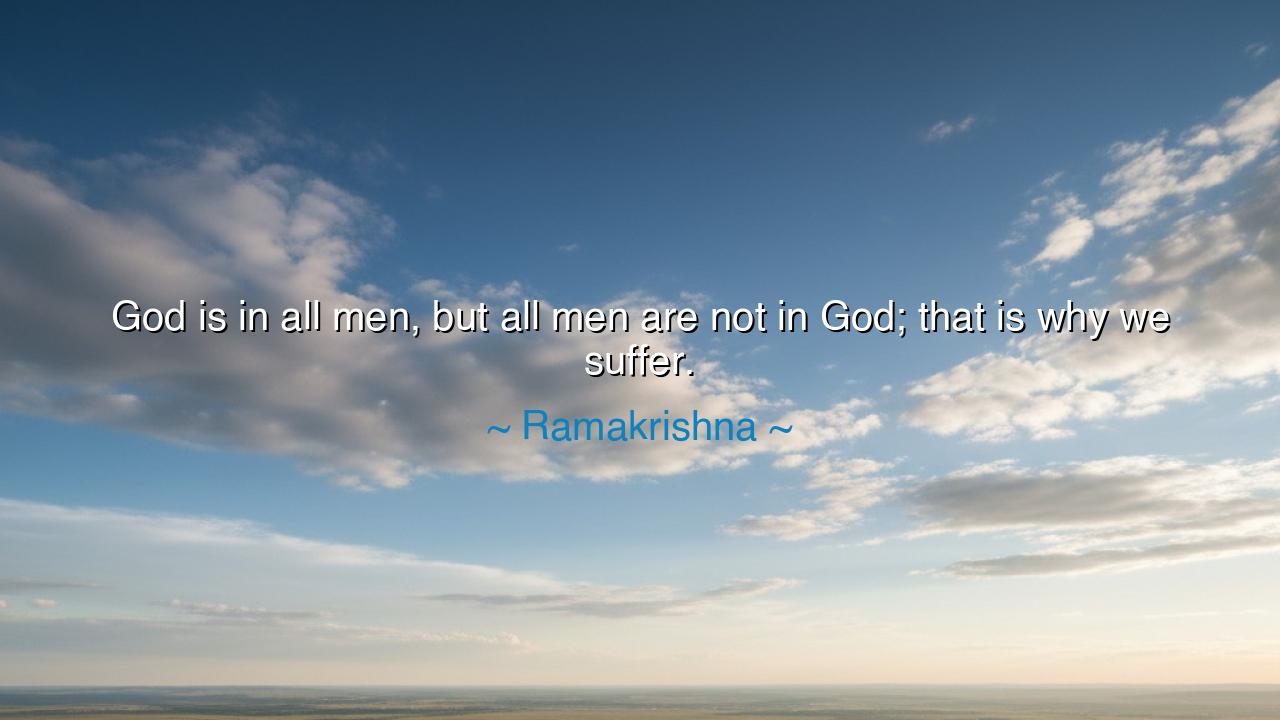
God is in all men, but all men are not in God; that is why we






O seekers of truth, gather your hearts and minds, for I bring you the profound words of Ramakrishna, a soul who understood the essence of suffering and the divine presence that resides within us all: "God is in all men, but all men are not in God; that is why we suffer." These words, though simple in their phrasing, speak to the very core of the human condition. The idea that God resides in every man is a truth that transcends time and place. It is a reminder that the divine essence is woven into the fabric of all existence, yet, it is through our own ignorance, our disconnection, that we experience suffering.
In the ancient world, the great thinkers and mystics understood that God or the divine was not some distant, unreachable force, but a presence that permeates all things. Plato, the philosopher of Athens, spoke of the soul’s connection to the divine and how it is through knowledge and inner purification that one can come into alignment with this higher truth. To know God is not simply to understand an external force, but to realize that the divine exists within, waiting to be recognized. Ramakrishna echoes this ancient wisdom, showing us that God is already within us, but it is our ignorance or disconnection from this truth that brings about our suffering. We are all, in essence, divine beings, yet we fail to see this truth, and it is this blindness that causes our pain.
Consider the story of Buddha, a being who transcended the suffering of the world. Siddhartha Gautama was born into a life of luxury, shielded from the harshness of the world. Yet, when he came face-to-face with suffering, it shook him to the core. He realized that suffering is a part of existence, but it is through the realization of our connection to the divine—the awakening to the truth of who we truly are—that we can transcend suffering. Just as Buddha recognized the interconnectedness of all things and the divine within, so too does Ramakrishna remind us that our suffering comes from the gap between who we truly are—divine beings—and how we live our lives in ignorance of that truth.
Yet, this idea is not just a mystical concept reserved for sages and enlightened ones. It is a truth that can be experienced by each of us in the depths of our own lives. Consider the great leaders who have transcended ordinary suffering to bring light and wisdom to the world—Mahatma Gandhi, Martin Luther King Jr., and Mother Teresa. These individuals did not escape suffering, but through their connection to the divine, they transformed their pain into service, into action, into a path of love and compassion for others. Gandhi, for example, who led a nation to freedom, did so not because he was free from suffering, but because he had a deep connection to the divine and recognized the divinity in all people. Through this inner alignment, he transcended his personal suffering and led others to do the same.
In the everyday life of a person, suffering comes in many forms—loss, regret, loneliness, and fear. These are the pains of disconnection, of forgetting our true nature. When we fail to see the divinity within ourselves and others, we create barriers, and these barriers lead to suffering. Ramakrishna teaches us that if we could only recognize that God is already in us, and if we could live in accordance with that truth, much of our suffering would dissolve. It is not external forces that cause us to suffer, but the internal struggle, the tension between who we are and who we think we are. To awaken to the truth of our divine nature is to open the door to peace, to love, and to freedom.
O children of wisdom, the lesson is clear: suffering is not the result of the world’s cruelty, but of our failure to recognize the divine within us. God resides in all of us, and through spiritual discipline, through awareness, and through service, we can reconnect with that divinity and transcend the pain that seems so pervasive in the world. We are all divine beings, and it is only when we forget this truth that we become lost in suffering. The path to peace and liberation lies in our ability to recognize the divinity in ourselves and in others, to live in alignment with that divine truth, and to serve from a place of love and understanding.
So, let this wisdom guide you: do not seek to escape suffering, for it is a natural part of the human experience. Instead, seek to understand its source. The key to transcending pain lies in recognizing the divine within you. Through spiritual practice, through compassion, and through awareness, come into alignment with the truth that God is within you, and in that recognition, you will find the strength to rise above suffering. Live each day knowing that you are not separate from the divine, but a part of the divine whole. And in doing so, you will not only transcend your own suffering, but you will help lift others from theirs as well.






AAdministratorAdministrator
Welcome, honored guests. Please leave a comment, we will respond soon